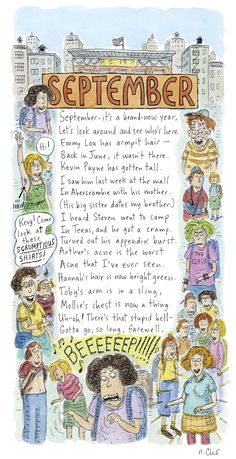“September – it’s a brand-new year. Let’s look around and see who’s here.”
What a brilliant cartoon in the September 15th issue of the New Yorker magazine – it completely cracked me up!
Reading through the poem and following the cartoon characters starting from the upper left-hand character of Emily, innocently raising her hand and showing her armpit hair – then glancing down and around the page to the lower right-hand character of Mollie, seizing the spotlight with her eye-catching chest, I can’t help but laugh out loud while thinking back to those adolescent years growing up in Hong Kong.
Flashback to first day of 10th grade in an all-girls school.
“OH… Maggie is now wearing glasses! She looks far more intellectual now…”
I was shocked how a pair of eyeglasses could dramatically alter my friend’s image, making her appear more mature and scholarly. I remember feeling so envious and ashamed of myself, thinking – why wasn’t I wearing glasses? Is it because I wasn’t reading enough?
What’s next?
I decided to fake having problems with my eyes. I told my mom one day that I couldn’t see far, I must be getting near-sighted like Maggie. So my mom dragged me to an optical shop for an exam. Once there, I deliberately read all the letters posted on the wall – wrong – just so that I could get a pair of glasses.
Not long afterwards, I noticed another friend suddenly revealing a part of her body that never grabbed my attention until now.
“Wow, Agnes is starting to wear her bras… “ I whispered inside. “But – urgh, I’m still not quite ready for that. What’s wrong with me? Will I ever grow up? ”
Yes, those were the days – my real thoughts, real fears.
Adolescent fears during puberty as we’ve all experienced – are normal.
But as I’ve discovered in my own life, some of those adolescent feelings of envy, embarrassment, inferiority and insecurity don’t die young.
In fact, some form of insecurity and inferiority can stay with us, adversely affecting our relationships with our friends, colleagues and family until we start recognizing them and being honest with ourselves.
Here are three lessons I’ve learned about growing out of insecurity and inferiority:-
1) Seeing And Comparing – Consciously or unconsciously, we always compare. But comparing yourself with other people who have something that you don’t that you may want, can actually be disorienting. It distracts you from searching within yourself – the essence of who you want to be.
Take my reaction to Maggie for example when I felt envious of her “intellectual” look, I realized later that what I really wanted to be – was not to look “intellectual”, but actually be one. So obviously getting a pair of glasses may make me “look” – at least in my mind – “intellectual” but what I’m really after was respect and admiration. There are of course many ways to win respect and admiration – one way, is to cultivate character traits that help you win friends – kindness, compassion, empathy, generosity, humor – to name a few. So I learned over time that digging deeper into the roots of comparison is helpful for me to see beyond the superficial surface into what it really takes to become a confident person.
2) Seeing Without Judging –
We tend to walk around with a measuring stick – seeing and noticing who’s better looking, fitter, smarter. But what we see is often misleading especially if we are surrounded by a wide spectrum of people of different racial, ethnic, social and cultural backgrounds who show many different ways of expressing themselves depending on the time and place, circumstances and surroundings.
Judging for the sake of evaluating the merits or propriety of certain thoughts or behavior is different from judging for the sake of ranking and classifying. The latter can be demeaning, and diverting your focus away from seeing “who is here” – who is the person inside. What lies inside a person is far more interesting and important that what meets the eyes. Once I’d learned to seeing beyond judgment, I start understanding what makes us human – we are all vulnerable.
3) Seeing While Seeking
Believe it or not, our adolescent habit of seeing and noting physical changes in our friends or in ourselves as something awkward or embarrassing, funny or quirky, can actually be a healthy ground to incubate a sense of humor about our shared humanity. Sometimes, we suffer because we can’t talk about it or joke about it.
Why not laugh about it as a way to seek common ground – without judgment or fear?



